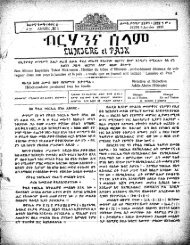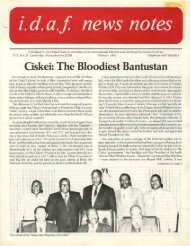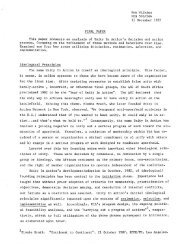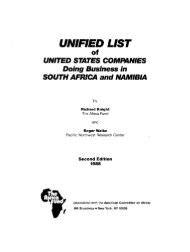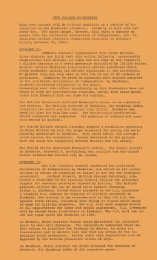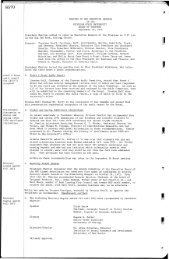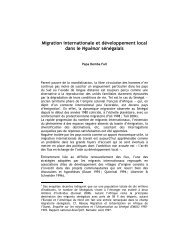Marshall Hunt - Matrix
Marshall Hunt - Matrix
Marshall Hunt - Matrix
You also want an ePaper? Increase the reach of your titles
YUMPU automatically turns print PDFs into web optimized ePapers that Google loves.
player, absolutely bald, blowing his guts out with this hail just popping.<br />
A devoted musician.<br />
So I said, "Babe, just pause for a minute and think of your position<br />
in this country, in society, and every other thing. Here you are.<br />
Reverence is being paid by this poor band out there in that hail.<br />
The mayor has already welcomed you. We don't know what will<br />
happen the rest of the day, but it sort of gives you another chance to<br />
gauge your position in the United States of America. Look at that<br />
tuba player down there. It's a sight I'll never forget. And Babe, you<br />
shouldn't forget this welcome here."<br />
The Babe just turned around and said, "Okay, kid, let's eat."<br />
The Babe made two movies. I went out to Hollywood on one of<br />
them. The Babe insisted that I be installed as some sort of technical<br />
adviser. The movie was called Headin' Home) with Anna Q. Nilsson.<br />
She was one of the stars of the day. This was in 1928 or '29, right<br />
when Hollywood was at its absolute peak. Lord, he was big out there.<br />
It was a budget film and had to be completed at a certain time,<br />
and Babe sawall this stuff around town. So Barrow sent Artie<br />
McGovern out to be his keeper. Artie had a couple of fancy gymnasiums<br />
in New York, a fine physical director. He put the Babe to bed<br />
every night, usually at nine o'clock. Broke the Babe's heart. He was<br />
never in the midst of so much at one time and could get so little.<br />
One night the Babe and Artie were invited out. They had permission<br />
to go. The Babe had promised to autograph a couple of hundred<br />
baseballs. So he came down to my room and asked me to do<br />
him a favor.<br />
"What is it, Babe?" I asked him.<br />
"Well, there's a bunch of baseballs on my bed. Will you autograph<br />
'em as fast as you can? And then just leave 'em on the bed?"<br />
I autographed about 250, and the Babe came back with Artie<br />
and knocked on my door. I was reading. He said, "I saw the<br />
baseballs and they're good. Thank you a lot."<br />
The next morning I was having breakfast and Babe came over<br />
to my table and said, "Say, kid, don't get too good with that pen."<br />
When it came time to go back to New York, we got on the<br />
Union Pacific. I was walking through the cars and who do I run into<br />
but Joe Patterson, publisher of the News. I didn't know he was out<br />
there. He said, "Hey, what are you doing here?"<br />
22 NO CHEERING IN THE PRESS BOX<br />
I told him and he said, "Is the Babe actually on this train?"<br />
I said, "Well, yes, sure. We're going back to New York."<br />
So here was Patterson on the same train. He was a great newspaperman.<br />
He realized by us latching onto the Babe we had done a<br />
good thing. It was 'Patterson, from the beginning, who saw we could<br />
increase circulation by developing a strong sports department. He always<br />
wanted us to write in kind of a bouncy way. Very biff, bang,<br />
boom stuff.<br />
I could see he was awed when he realized we were on the same<br />
train, and he asked me if I could get the Babe back into his drawing<br />
room for a little chat.<br />
I said, "Oh, I think so. I'll talk to him."<br />
So Patterson said, ''I'm awfully tired. But if you can bring the<br />
Babe back to the drawing room, I'll talk to him for a while. And<br />
when I signal like this"-he brushed his fingers against his coat<br />
"just say, 'We've got to go, Babe. We've got to go.' " Tha't was sort<br />
of the brush-off sign, the sign for us to leave.<br />
I brought the Babe in and I thought we'd be talking for about<br />
ten minutes. I kept waiting for the sign. This went on for about two<br />
hours. The Babe enjoyed it. Patterson had played some baseball at<br />
Yale, and even after he became publisher, he would occasionally<br />
come out to the ball park. Patterson went out to see things for himself.<br />
That's what set him aside from most publishers. Finally, I got<br />
the signal and I said, "Okay, Babe," and we left. I never saw Patterson<br />
on the train again. I ducked him. I thought we had done a pretty<br />
good job, as it was.<br />
Only once did I have an awkward time with the Babe. There<br />
was the question of the paternity of a daughter in 1923. And Payne<br />
-he was the city editor in New York, really a busybody-called me<br />
up in New Orleans and asked me to go up to the Babe and find out,<br />
because the story was breaking in New York. Hints came out.<br />
I went up there and I said, "Babe, I've never asked you any of<br />
these personal questions before, but the heat's on from the office and<br />
I'm going to have to ask you some questions."<br />
He said, "Go ahead."<br />
But when I started he began to hedge. He was a little bit mad.<br />
He stalled his way through, lying like hell. I knew that. So I called<br />
Payne back and said, "Listen, we've got along fine with the Babe and<br />
<strong>Marshall</strong> <strong>Hunt</strong> 23
too deep into that for me. But he really was a student of literature,<br />
as was proved when he was on "Information Please."<br />
So versatile were the sportswriters that every once in a while<br />
there would be a good story in court, maybe crime or an investigation<br />
that needed some color. The witnesses were colorful, the judge<br />
was colorful. So they'd yank a baseball writer and send him'down to<br />
court for six weeks until the case was over because the sportswriters<br />
did a better job of describing. They were a little shaky on law,<br />
maybe, but that could be taken care of very easily by going to the<br />
prosecuting attorney, or any attorney, and getting straightened out<br />
on the terminology. They could do this after the day's hearing. The<br />
sportswriters were absolutely the best writers on the papers in those<br />
days, and baseball writing was the best of all the jobs on a newspaper.<br />
You'd think that of the drama reviewers, but that was a different<br />
deal. You were dealing with a strange bunch of people there.<br />
Some papers had excellent drama critics. They wrote very, very well<br />
-about drama. Sometimes a publisher or a managing editor would<br />
send the drama critic to the ball park to cover a World Series game<br />
and he'd fall flat on his face. Write some of the most ludicrous stuff<br />
in the world. Some of it so preposterous that the managing editor, in<br />
reading it when it came over the wire, would throw it in the garbage<br />
can.<br />
In the twenties and earlier, the publishers wanted long stories.<br />
The reporters were paid by space, by the inch. I think they got ten<br />
dollars a column, about twenty inches to the column. The one thing<br />
these fellows wanted to avoid was having their stories cut. So they<br />
became very practiced and could weave a story like a cable, or a<br />
chain. They wrote with pencil, sometimes very swiftly.<br />
Take the case of Jack Kieran. He'd be assigned to a Yale<br />
Harvard game at New Haven, and he would have with him a program<br />
from the year before and he would write how the band struck<br />
up and played so-and-so and so-and-so. Then the chorus sang<br />
so-and-so. Then they marched around the field and then Yale sang<br />
this and Harvard sang that. Then Jack would describe the crowd,<br />
how it was a little slow getting into the stadium. He would write all<br />
of this in longhand, on the train, going up to New Haven, page after<br />
page. He would even quote the song, three verses. Then he'd put<br />
26<br />
NO CHEERING IN THE PRESS BOX<br />
that in his pocket, get off the train, have lunch, and go out to Yale<br />
Bowl. He'd make copious notes. At the end of the game, in the cold<br />
weather, Kieran would attack the typewriter and write and write.<br />
Sometimes Yale wouldn't sing the full three verses of a song. Jack<br />
would edit the copy he had written in advance so it would be accurate<br />
and, of course, it made a great impression around town. How<br />
could a man write so much and so fast? They didn't know the trick.<br />
Dan Daniel was another one who did that very successfully.<br />
Dan, who was a prolific writer, anyway, would go up to New London<br />
to cover a Yale-Harvard regatta. Dan, at the time, was working for<br />
Munsey, a notorious penny pincher. The first thing Dan would do<br />
after he got off the train in New London would be to go up to the<br />
Mohican Hotel, copy off most of the names on the register, then<br />
write down the names of others he saw in the lobby. Dan would interview<br />
quite a few old-time Yale-Harvard fellows he spotted in the<br />
lobby. Then he wrote about the regatta and the old grads at the<br />
hotel, because his boss, Munsey, owned it. And, of course, he'd throw<br />
in a few words about the superb cuisine and the excellent service<br />
that everybody enjoyed there and he would mention Munsey once or<br />
twice. That pleased old Munsey a great deal. Others would wonder<br />
how Dan could write so much, so fast. He did it in takes. Dan knew<br />
most of the angles about writing, covering things minutely.<br />
I always got a kick out of 'Will Wedge, who worked for the New<br />
York Sun for a long time. Will covered nothing but baseball, really.<br />
He had a few assignments in the wintertime, and of course, traveling<br />
along with Wedge was Ford Frick, who was born in a small town in<br />
Indiana, went to DePauw University, then got out in Colorado<br />
somehow or other. Arthur Brisbane, old double dome, picked him<br />
up in Colorado and sent him into New York. There was quite a bit<br />
of country about Ford, really. Apparently while at DePauw, Ford<br />
had earned a few dollars by doing stenographic work. He was very<br />
fast with the typewriter. Wedge was a poet and he tried to have<br />
everything sound like literature and was an awfully slow writer. At<br />
the end of a game, Frick, with his lightning touch, could bat out an<br />
overnight story in eight minutes flat, right there at the ball park, ,put<br />
it on the wire, and he was through for the day. Wedge, before the<br />
game, had probably interviewed a rookie, at great length. He knew<br />
<strong>Marshall</strong> <strong>Hunt</strong><br />
27
liked Peg's stuff. I liked anybody who could knock 'em out with a<br />
fine lead, funny, or good description of something, something that<br />
told the story quickly. It's a real art to do that, and Peg was an artist.<br />
I remember one time Peg covered a dog show in Madison<br />
Square Garden, and he started out saying there were all these thousands<br />
and thousands of dogs but he discovered not one of them was<br />
named Rover or Troy, not one of them out of three or four thousand<br />
dogs. He developed that theme right on through beautifully.<br />
He didn't even know who won, but it was easier to read his story<br />
than the one in the Times that ran two columns, listing all those<br />
long names those beasts have.<br />
Toward the end of Peg's connection with the Hearst outfit his<br />
stuff was buried in the back of the paper-in the classified ads,<br />
among the rupture pads and patent medicine ads, electric belts and<br />
all that. It drove Peg furious. Newspapers across the country owe<br />
quite a debt to Peg. His writing inspired young reporters to improve<br />
their product, to put more punch into it, to assemble a greater vocabulary,<br />
to be more careful with the structure of sentences.<br />
I heard Peg say one time, "My God, if you're going to spend a<br />
couple of hours writing, why not do some good? Why not entertain<br />
people, or annoy people? Just don't turn out a bunch of dull tripe."<br />
I don't know who ordered Peg's stuff into the back of the paper,<br />
but I suppose it must have been the same young Hearst that Bill Slocum<br />
of the New York American and I used to lead out to the ball<br />
park, by his hand. Slocum, working for a Hearst newspaper, had the<br />
duty of picking the kid up and bringing him to the ball park. Sometimes<br />
I'd take my car and we'd pick him up somewhere. He'd sit<br />
through the game, very well behaved.<br />
I still hear from Mrs. Pegler once in a while. She likes oysters.<br />
She calls up and I go over to the oyster plant and have them send out<br />
a good fat order. They arrive there in very good shape. She's a good<br />
cook. They have a nice place down there, in Tucson. He bought it<br />
when he was married to Julia Hartman. He bought forty acres, then<br />
later, I think, he took over forty more-adobe house, big swimming<br />
pool, a very comfortable place. And a Union Pacific caboose out in<br />
front which he wanted to use as an office. But he didn't live long<br />
enough.<br />
I don't know how the modem baseball writers feel about the<br />
32<br />
NO CHEERING IN THE PRESS BOX<br />
players and the owners, but I think that the relations are not the<br />
same as in the twenties. Most of us looked at the whole thing practically<br />
as a business. The owners, we noticed, wore Brooks Brothers<br />
suits and had rather round stomachs. They got into the barber shop<br />
every day. Their shoes were shined. They lived in nice houses. They<br />
drove in good cars. Well, that was okay with us. We never toadied to<br />
them. Every once in a while they'd throw a dinner. We'd go. Then<br />
the baseball writers, in turn, would throw a real fine dinner and invite<br />
the owners. The writers' relations with the owners and players<br />
were good.<br />
I only had one argument with a manager-with John McGraw.<br />
He was a feisty little devil. He got into lots of fights. Never won a<br />
single one of them, I think. Started in fighting when he was a third<br />
baseman for the Baltimore Orioles years ago. One night, on a station<br />
platform in Pittsburgh, he came at me and said he was going to<br />
knock the Jesus out of me. And I said, "Go ahead. Try it."<br />
He had been drinking a lot and was objecting to a story I had<br />
written a day or two before about a couple of his Giant players being<br />
fined twenty dollars apiece for not obeying a signal and for not being<br />
alert. I rode down to the station in a taxicab with the two players,<br />
rookies. Didn't even know them, hardly at all. They were talking<br />
about these fines. McGraw never announced fines. They spilled everything.<br />
So when we got to the station I wrote about fifty words right<br />
there, handed it to Western Union and it was in the New York News<br />
that night. A day or two later McGraw heard about it, probably<br />
from a phone call from the New York office. So he went after me on<br />
that platform, but some player sort of grabbed McGraw and he<br />
cooled off instantly. I never liked him particularly. He was ill up in<br />
his home in Westchester County, and as I say, he was the least of my<br />
favorite managers. But he asked if I would come up and shake his<br />
hand before he died. I went up. I couldn't hardly see any sense in<br />
not going.<br />
<strong>Marshall</strong> <strong>Hunt</strong><br />
33


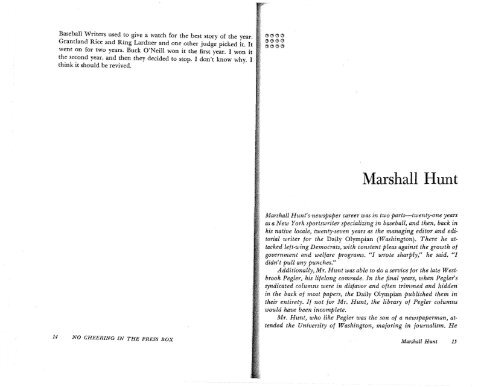

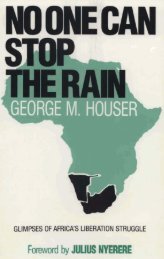

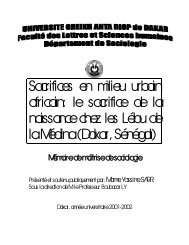
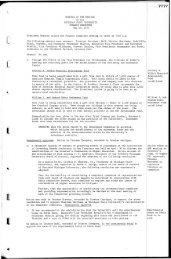
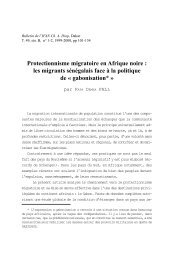

![Synthèse [6] DEFALL..INSTRAW.pdf - Matrix](https://img.yumpu.com/17880734/1/190x245/synthese-6-defallinstrawpdf-matrix.jpg?quality=85)
